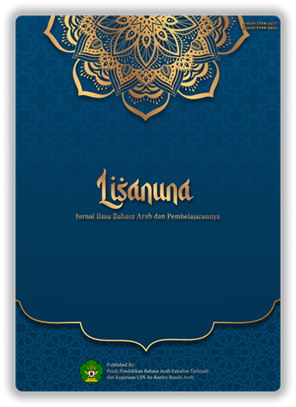The Impact of STAD on Arabic Learning Outcomes of Tenth Grade In Senior High School Student
DOI:
https://doi.org/10.22373/xxwmxy95Keywords:
STAD, cooperative learning, Arabic language, learning outcomes, Semi-Experimental.Abstract
The Arabic language learning at MAN 4 Medan indicates that some students exhibit a lack of enthusiasm, limited interaction, and ineffective collaboration among students. Additionally, teachers face challenges such as time and resource constraints, which result in low student learning outcomes. This research aims to identify the implementation of the STAD (Student Teams Achievement Divisions) cooperative learning strategy in Arabic language instruction and to evaluate its impact on student learning outcomes. The study involved 30 students from grade tenth of MAN 4 Medan as samples. Research instruments included Pre and Post Tests, observation sheets, and student response questionnaires. The results show a significant improvement in student learning outcomes, with the average post-test score (82.8%) being higher than the pre-test score (53.5%). N-Gain analysis indicates a moderate increase in learning effectiveness (0.6). Thus, the STAD strategy has proven effective in enhancing Arabic language learning outcomes and can serve as an alternative in Arabic language teaching in schools.
Downloads
References
أحمد ونجي محمد علوي. "العربية لغة للوحي الإلهي: قراءة في آيات عربية القرآن." دراسات: العلوم الإنسانية والاجتماعية 51، رقم 4 (2024): 425-434.
البدوي، السعيد. العربية للجميع: دليل اللغة العربية كلغة أجنبية. الرياض: العربية للجميع، ٢٠٠٦م.
بهجات، أ.د. وآخرون. التعلم التعاوني: عناصره واستراتيجيات تطبيقه. قسم المناهج وطرق تدريس العلوم، كلية التربية بقنا، جامعة جنوب الوادي، ٢٠١٨م.
الزركشي، بدر الدين. البرهان في علوم القرآن. بيروت: دار المعرفة، ١٩٨8م.
زين الدين، د. "القرآن الكريم وتأثيره على تطور اللغة العربية." إحياء العربية: مجلة تعليم اللغة العربية وآدابها ٥، 2016م.
الغزالي، أبو حامد. إحياء علوم الدين. القاهرة: دار التقوى، ٢٠٠٥م.
القرآن الكريم. سورة يوسف: ٢.
مقدسي، جورج. صعود الكليات: مؤسسات التعليم في الإسلام والغرب. إدنبرة: مطبعة جامعة إدنبرة،1981م.
نُجَيّ، إسمي، أكمل الوالد أحكَاس، ونصرون سليم. "تأثير الوسائل التعليمية القائمة على تطبيق التعلم الممتع والسهل (Fun Easy Learn) في إتقان المفردات لدى طلاب الصف السابع في المدرسة المتوسطة الإعدادية الحكومية الرابعة ميدان." التطور: المجلة الدولية للعلوم الاجتماعية ٣، العدد ١ (٢٠٢٥م): ٨-١٦.
Archer, David. “The Effect of Sample Size on Test Results.” Assembly 55, no. 9 (2012): 100–117.
Azra, Azyumardi. “THE ORIGINS OF ISLAMIC REFORMISM IN SOUTHEAST ASIA: Networks of Malay-Indonesian and Middle Eastern ‘Ulamāi in the Seventeenth and Eighteenth Century.” The Origins of Islamic Reformism in Southeast Asia: Networks of Malay-Indonesian and Middle Eastern ‘Ulamāi in the Seventeenth and Eighteenth Century, 2022, 1–254.
Ghafoory, Dr. Dilovan sayfuddin, Miran, Lana Dlawar. “Journal of Tikrit University for Humanities.” Journal of Tikrit University for Humanities 26 (2022): 1–27.
Isnaini, Firdha, and Machful Indra Kurniawan. “The Concept of STAD (Student Team Achievement Division) Cooperative Learning Model According to Robert E. Slavin.” Indonesian Journal of Education Methods Development 10 (2020). https://doi.org/10.21070/ijemd.v10i.561.
Kementrian Agama. “Keputusan Direktur Jenderal Islam 752 Tahun 2021 POS Ujian MadrasahTP2020-2021,” 2021.
Kurikulum, Konteks, and S D N Semangat. “Analisis Kendala Penerapan Cooperative Learning Pada Peserta,” 2025, 516–29.
Masyudi, Masyudi. “Strategi Pembelajaran Kooperatif Model Student Teams Achievement Division (Stad) Terhadap Hasil Belajar Bahasa Arab.” Tawazun: Jurnal Pendidikan Islam 11, no. 2 (2019): 247. https://doi.org/10.32832/tawazun.v11i2.1672.
Murtiyasa, Budi, and Widi Hayuningtyas. “Pengaruh Strategi Pembelajaran Tipe Kooperatif Dan Kreativitas Siswa Terhadap Hasil Belajar Matematika.” AKSIOMA: Jurnal Program Studi Pendidikan Matematika 9, no. 2 (2020): 358–68. https://doi.org/10.24127/ajpm.v9i2.2765.
Rakhman, Anita. “P2M STKIP Siliwangi ( STAD ) USED IN LEARNING PRACTICE OF TRANSLATING AND P2M STKIP Siliwangi” 2, no. 1 (2015).
Suryanto, Nono, and Hana Adhia. “Peningkatan Hasil Belajar Matematika Peserta Didik Menggunakan Model Pembelajaran Kooperatif Tipe Think Pair Share Di Kelas VIII Pondok Pesantren Waratsatul Anbiya’ Kota Solok.” THEOREMS (THE JOuRnal of MathEMatics) 7, no. 2 (2022): 93–99. https://doi.org/10.36665/theorems.v7i2.649.
Tejada, Jeffry J, Joyce Raymond, and B Punzalan. “On the Misuse of Slovin’s Formula.” The Philippine Statistician 61, no. 1 (2012): 8.
Downloads
Published
Issue
Section
License
Copyright (c) 2025 Wira Fitria

This work is licensed under a Creative Commons Attribution-ShareAlike 4.0 International License.
1. Proposed Policy for Journals That Offer Open Access Authors who publish with this journal agree to the following terms:
1.a. Authors retain copyright and grant the journal right of first publication with the work simultaneously licensed under a Creative Commons Attribution License that allows others to share the work with an acknowledgement of the work's authorship and initial publication in this journal.
1.b. Authors are able to enter into separate, additional contractual arrangements for the non-exclusive distribution of the journal's published version of the work (e.g., post it to an institutional repository or publish it in a book), with an acknowledgement of its initial publication in this journal.
1.c. Authors are permitted and encouraged to post their work online (e.g., in institutional repositories or on their website) prior to and during the submission process, as it can lead to productive exchanges, as well as earlier and greater citation of published work (See The Effect of Open Access).
2. Proposed Policy for Journals That Offer Delayed Open Access Authors who publish with this journal agree to the following terms:
2.a. Authors retain copyright and grant the journal right of first publication, with the work [SPECIFY PERIOD OF TIME] after publication simultaneously licensed under a Creative Commons Attribution License that allows others to share the work with an acknowledgement of the work's authorship and initial publication in this journal.
2.b. Authors are able to enter into separate, additional contractual arrangements for the non-exclusive distribution of the journal's published version of the work (e.g., post it to an institutional repository or publish it in a book), with an acknowledgement of its initial publication in this journal.
2.c. Authors are permitted and encouraged to post their work online (e.g., in institutional repositories or on their website) prior to and during the submission process, as it can lead to productive exchanges, as well as earlier and greater citation of published work (See The Effect of Open Access).

